School-to-Work class creating connections
April 4, 2017
A handful of students are not’t part of the wave of their classmates fighting to get out of the crowded parking lot and go home when the 2:50 bell rings. These students are part of the School to Work class, and spend their afternoons at various internships.
School to Work is a class offered to seniors and juniors that allows students to get out of the classroom and into the work field. “It’s an unbelievable opportunity for kids,” associate principal Jerry Stratton said. “We have people who are engaging in what they think is maybe a career and have a huge leg up on competition.”
Kristine Volesky teaches the class first semester, during which time students learn the principles to operating in the workplace. Because students in the class can earn eight DMACC credits, Volesky has to follow DMACC curriculum during first semester. During second semester, students intern at an array of locations to learn about job fields that they’re interested in. “In the spring where we don’t have any classroom content, so there’s definitely much more initiative to make sure you’re doing what you’re exactly suppose to be doing,” Volesky said.
Volesky works with students to help match them up with internships and make sure it is something they are genuinely interested in. “We did a lot of career research to start off the bat to make sure that they know that they knew what they were going into,” she said.
For students in School to Work, their schedule is harder to work with because they need several free periods in order to have enough hours to intern. Associate principal Jerry Stratton deals with schedule changes. “We manipulated their schedules to make it most effective for them to work with their employers,” Stratton said.
Often, students only have time to take a few core classes, since electives take up too much time in a schedule. As a result, students involved in music classes like band and choir have rarely been able to take School to Work.
There are high expectations for students in the School to Work class, and they are expected to be top-level employees. “Whatever happens to a student in that (work) environment, if they do not follow through, that could cause us to lose an opportunity for a student in the future,” Stratton said.
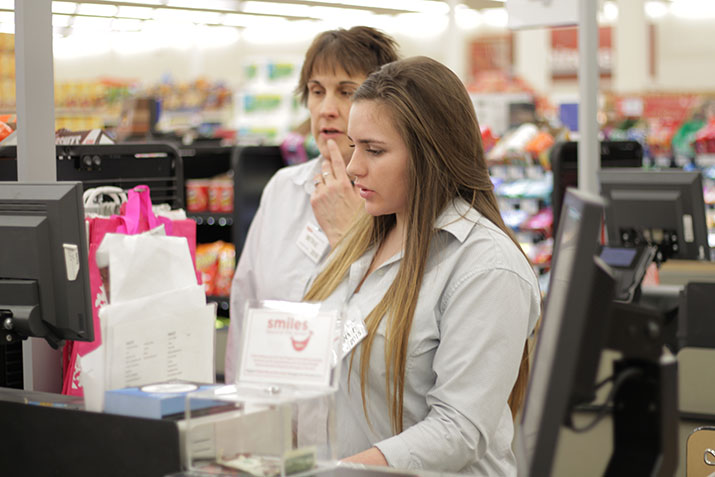
Adina Blazevic ‘18 assists a fellow employee in correcting a customer’s receipt. She was put in charge of supervising the cashiers at the Johnston HyVee.
Adina Blazevic
Adina Blazevic ‘18 is an HR management intern at Johnston HyVee. As part of her internship, Blazevic deals with customer complaints, supervises the front end which includes checkers and courtesy workers and directs them when the managers are not there.
Blazevic performs other tasks like helping the HR manager with the work schedule, and other more big-picture things. “We talk about markups and gross profit, like how we can make money as a store, what we need to sell items as to make money, etcetera,” she said.
Out of all of her classes, Blazevic believes that School to Work is one of the most helpful. “I think it’s probably the only class in this high school that prepares you for after high school and after college,” she said.
The class has played a major role in helping her decide what she wants to do after high school. “I want to go to college and it helped me decide that I want to go for business management HR, so it helps you get a light on ‘do I actually want to commit x amount of years college and money to this field’,” she said.
Blazevic is a unique case since she is the only junior in the School to Work class. The class is ideal for seniors so that they can get internships throughout the school year that hopefully last through college. “I was just lucky that I got in as a junior,” she said.
Blazevic now 17, was 16 when she started. “I was like the youngest supervisor they ever had,” she said. “I was literally supervising people that were seniors that are checkers so that was little awkward.”
She said it took a long time to gain people’s respect. “People would blow me off and say stuff under their breath but it got better eventually,” she said.
There have also been some difficulties from a time perspective because Blazevic had to maintain the hours she was already working at Hy-Vee prior to her internship. “I worked like 25 hours a week during school even before School to Work because I have a lot of stuff to pay for,” she said. “It makes it a little bit more difficult because I have less time to get stuff done.”
(School to work) is probably the only class in this high school that prepares you for after high school and after college.
— Adina Blazevic
Nevertheless, valuable opportunities have come out of the School to Work class. For example, Volesky brought in professionals from local businesses like Pioneer to conduct mock interviews with the students. “The guy who interviewed me from Pioneer offered me a job,” Blazevic said.
Additionally, Blazevic has gotten opportunities from her internship. “[HyVee] told me that they want me as an assistant this year and this summer, so I’ll probably just work as an assistant my senior year,” she said.
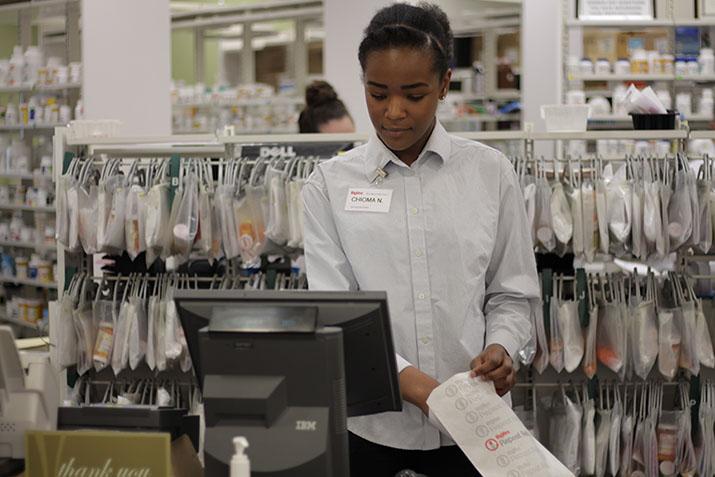
Chioma Nwizu ’17 prepares a prescription for a customer. She interns at the Johnston HyVee pharmacy.
Chioma Nwizu
Chioma Nwizu ‘17 is a paid intern in the Johnston HyVee pharmacy department. She is currently a registered pharmacy tech trainee, so she can do most of the tasks that a pharmacist does excluding finalizing orders and putting things on shelves, among others.
Even before taking School to Work, Nwizu was considering going into pharmacy. “Pharmacy is definitely up there on my top three of what I wanted to do after college,” she said.
Interning at a pharmacy is demanding, but Nwizu enjoys it. “It’s fast-paced and you don’t really know how fast time is going, which is really nice because I really enjoy being there,” she said.
Nwizu said working in the pharmacy is a group effort. “We all take turns doing different things,” she said. “If the pharmacist needs us to help her do anything we’ll help her do it, and it’s like a big system.”
Nwizu is the youngest person working the in the pharmacy, but she does not feel like she’s treated any differently. “It’s not really weird, it’s kind of just, ‘Oh you’re new, you’re younger, we kind of need to teach you’,” she said.
It’s fast-paced and you don’t really know how fast time is going, which is really nice because I really enjoy being there.
— Chioma Nwizu
There are also interns from Drake working in the pharmacy, so although Nwizu is a few years younger, they share a similar experience. “It’s kind of a learning experience for the (Drake) interns and me because we’re all trying to pursue pharmacy, and since they’re already in the pharmacy program I get the opportunity to ask them questions.”
Interning at HyVee has opened some doors for Nwizu.“[HyVee] said I could work [in the pharmacy] during college and after college if I wanted to,” she said.
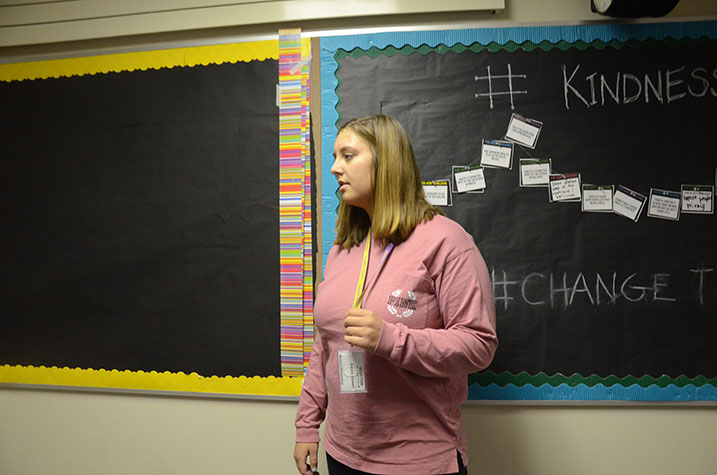
Natalie Stewart
It’s nice because I’m a senior in high school and not a senior in college, so I’m not rushing to get my student teaching done… I’ll have to do it but I will be more prepared.
Natalie Stewart ‘17 spends her afternoons surrounded by the second-grade class at Wallace Elementary School. She is an unpaid intern who assists all four of the second-grade classrooms. Her day consists of taking the students to lunch, helping teachers organize assignments and preparing lessons.
“My first couple of weeks it was kind of scary just because I didn’t know the kids,” Stewart said. ” I was kind of just put into this and then had the teachers saying can you do this, this and this.”
Stewart plans to attend college in hopes of becoming an elementary school teacher. School to Work class allows her to gain experience that would only be obtainable as a college student.
“It’s nice because I’m a senior in high school and not a senior in college, so I’m not rushing to get my student teaching done because there’s a lot of them coming into third and fourth grade,” she said. “They’re all rushing to get their last one in and I already have practice. I’ll have to do it but I will be more prepared.”
Stewart enjoys spending time with kids and getting to know them. After three hours at Wallace, she goes to a local daycare where she works for four more hours. She appreciates seeing activities she had done in elementary school, done by the students.
One memory she has from her childhood, that is reflected by the students is participating in a mock farmers market. The students sold small candies or items for 25 cents.
“I remember doing that in second grade and I brought care bear rings and little Lifesaver candies, and I sold that for 25 cents. Just seeing that I was like ‘oh my gosh,’ life was so easy back then,” she said.
My first couple of weeks it was kind of scary just because I didn’t know the kids. I was kind of just put into this.
— Natalie Stewart
Another aspect of Stewart’s day is helping students who may have trouble paying attention and following the rules. Some students respond better to her as they are with their teacher for much of their school day. One experience she had was with a student who had gone into the teacher’s closet, an area they are told not to enter.
Stewart is forced to find alternative ways of helping troublesome students. “We asked him to grow his brain because that’s what we have to talk about,” she said. “I was like, ‘okay let’s go grow our brains and do science.’ He really likes science so we kept him out in the hallway and did a mini-lab.”
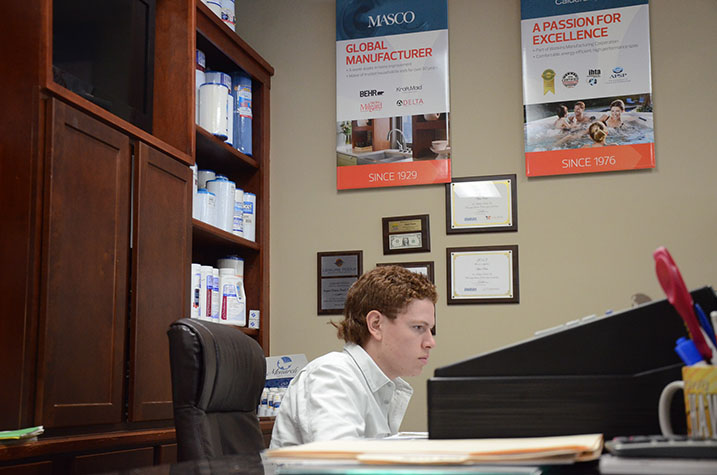
Ethan Bettis
Ethan Bettis ’17 spends his days balancing school, hockey and work. He works at AquaOasis Pool and Spa, a small business located on Merle Hay Road. Bettis is an unpaid intern who assists in sales of chemicals, hot tubs and pools. He works every day after school to fulfill the 170 hour minimum the students must achieve.
“I’m a salesman so I go in there and I’m able to watch over the store with my co-worker, Phil. We sell chemicals for pools and hot tubs, so they will keep your water clean, and we also sell pools and the hot tubs,” Bettis said.
Before going into the school to work program, he had known that he wanted to go into the sales field. Volesky assisted him in finding the right internship for his preferences. With some interest in small business, Bettis chose to work for the small sales company.
“I wanted to go into sales and it’s given me a big range of skills that I wouldn’t have learned here at school, and it’s also taught me other parts of small business, which is something I could always be interested in as well is starting my own business,” Bettis said.
Last semester his schedule consisted of five periods, including the school to work class. He would then spend the rest of his day working. Second semester Bettis only has four periods of classes, allowing him more time to work at AquaOasis.
Unlike some other students, Bettis does not completely know what his plans for college and after college are. “I still don’t really know what I want to go to college for,” Bettis said. “I’m trying to figure out what I can do with hockey in college.”
Bettis was offered a job at AquaOasis upon graduating. He enjoys School to Work because it allows him to experience working before he receives the job. It creates many real-world situations that students would not be able to experience in a class at school.
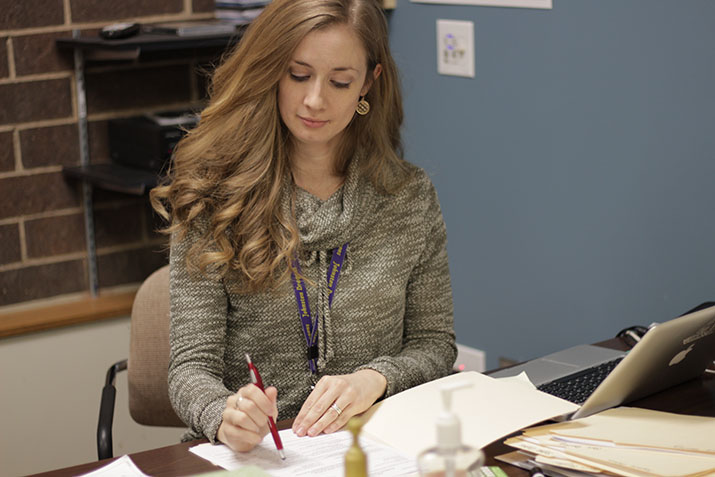
ob$lay • Apr 28, 2017 at 8:28 pm
very intresting